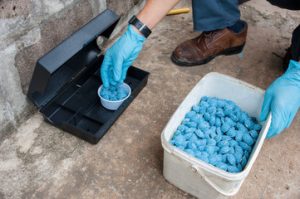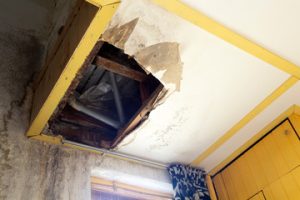If mice are present, it’s important to work with a pest management company that can effectively resolve the infestation. The best approach involves ongoing sanitation, sealing entry points, and storing food properly.
Mice invade buildings in search of food, shelter, and water. Droppings, gnaw marks, and a nose-wrinkling odour are all signs of an active infestation. Click here at https://www.rodentretreattexas.com/ to book an inspection.

Damage to Property
Mice can cause damage to property in a variety of ways. They are drawn to homes that offer abundant food sources, shelter, and easy access points such as open pet food containers, uncovered trash bins, and improperly stored pantry items. They are also attracted to warm spaces such as basements and attics. Their incessant need to chew, driven by their ever-growing teeth, can lead them to gnaw through wood, drywall, insulation, and electrical wiring. This can result in costly repairs, power outages, and fire hazards.
The droppings and gnaw marks left behind by mice can leave an unpleasant, lingering odor. They can also contaminate food and cause significant structural damage to structures such as walls, flooring, and cabinets. In addition, mice carry pathogens that can spread diseases affecting both humans and pets, such as allergies, rat bite fever, Salmonellosis, Leptospirosis, and Hantavirus.
Mice infestations should be addressed immediately. A quick response can mitigate the potential for physical damage and reduce the cost of repair and restoration. In addition, it can save homeowners the frustration and depreciation of having to sell a home with visible signs of rodents. Buyers may demand a lower price or be unwilling to pay full market value for properties with a history of pest problems. Taking precautionary measures such as maintaining sanitation standards, sealing potential entry points, and routinely checking for mouse activity can significantly lower the risk of infestation.
Health Concerns
Regardless of how cute mice may seem, these rodents have serious health implications for property owners. They often carry disease-causing pathogens and transmit them through their droppings, urine, saliva, and bites. Their constant chewing can also cause damage to structures by gnawing through wood, plastic, and electrical wires.
Mice infestations can also be dangerous to human health by triggering allergic reactions and exacerbating asthma symptoms. The proteins found in mouse droppings, urine, and saliva can become airborne and trigger itchy eyes, skin rashes, and asthma attacks in sensitive people. Additionally, mice infestations can lead to respiratory issues due to their habit of burrowing into insulation and deteriorating it over time.
The key to preventing damage caused by mice is quick recognition and prompt action. Spotting a few droppings, hearing rustling in the walls and ceilings, or seeing signs of damage to furniture are all early indicators that you might have a problem. Moreover, mice create scent trails as they travel throughout structures and can leave behind these olfactory markers even after they have been eliminated.
You can also identify possible problems by looking for gnaw marks and examining the attic, basement, behind appliances, or wall cavities. Additionally, sprinkle flour or talcum powder in suspicious areas to see if you can detect mouse paw prints. This will give you a clear idea of the extent of the infestation and allow you to take preventive measures, such as sealing entry points and keeping food in airtight containers.
Stress
There are several key indicators of a mice infestation that warrant immediate action, including sightings, droppings, and damage to furniture or household goods. The presence of gnaw marks on wooden beams, doors, and walls is also a clear indication of an ongoing mouse problem. These gnaw marks indicate that the rodents are feeding and nesting in your home, and can cause further damage if not addressed promptly.
A mouse’s small size allows it to fit into narrow gaps and holes, and it can enter your home from outside through open windows, utility conduits, and vents. It’s easy for mice to find food sources inside your home, including crumbs, pet food, and improperly stored pantry items. They can also access a variety of water sources, including pet water bowls, leaky pipes, and condensation.
Mice are nocturnal and active during early evening, and use scent trails and ultrasonic sounds to communicate with one another. Regular cleaning, sealing entry points, and reducing clutter can make your home less appealing to mice.
A pest control professional can conduct a thorough inspection, assess the extent of the infestation, and determine an effective treatment plan. This may include baits, traps, and targeted exclusion methods. Follow-up visits can help ensure that the mice are eliminated and that preventive measures are working. This includes sealing new entry points, regularly checking for signs of activity, and using natural repellents to deter future mouse incursions.
Disruption
Mice are nimble creatures that can sneak into homes in search of food and shelter. If you notice chewed crumbs, half-eaten food, and other signs of rodent activity in your home, it could be a sign of a serious infestation that needs to be addressed immediately.
Unaddressed mice infestations can quickly get out of hand, causing a variety of issues that impact the daily lives of homeowners. Mice droppings, for example, can cause unpleasant odors throughout the home as they decay. Additionally, urine from mice can lead to moisture problems that affect the integrity of the house and increase energy bills.
Mice can also cause significant damage to the home’s structural components as they gnaw through various materials in their quest for food and nesting material. Their constant gnawing can also compromise electrical wiring, increasing the risk of fires.
The best way to ensure a mouse-free home is to regularly inspect and clean the property to identify and seal any entry points that are too small for mice to fit through. Additionally, it’s important to pay attention to any changes in the behavior of pets as they may show signs that mice are present. Finally, hiring a pest control service that offers inspections and targeted treatments can help you eliminate the problem before it gets out of hand.

